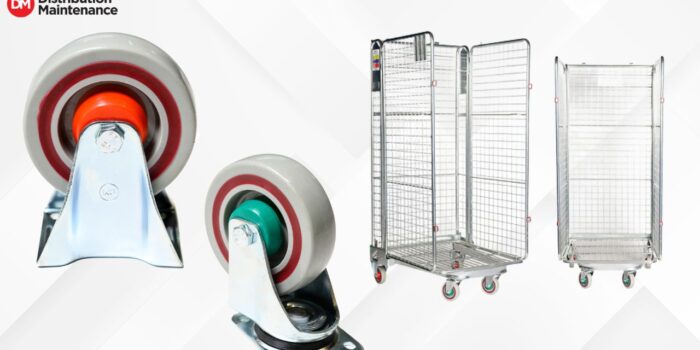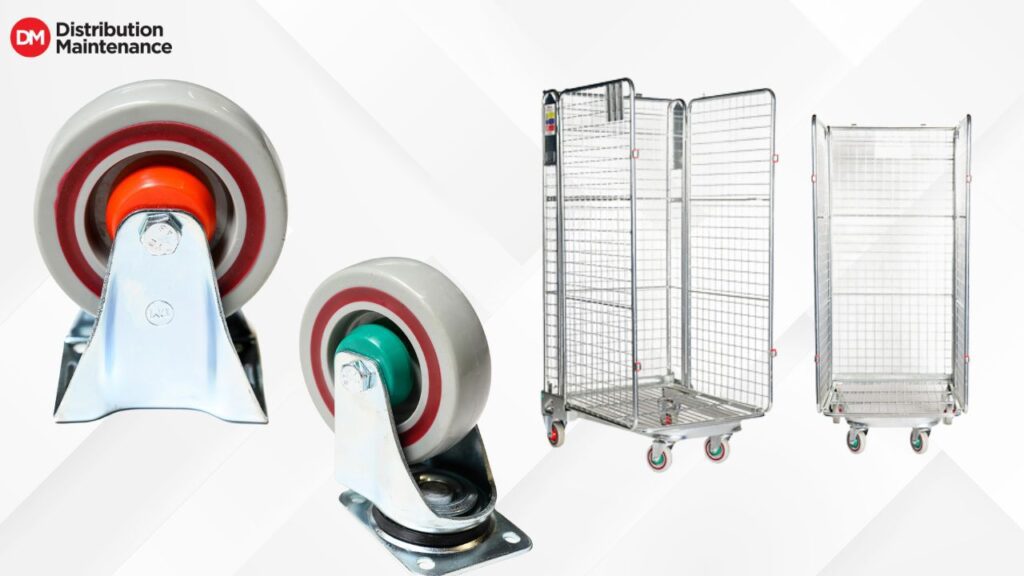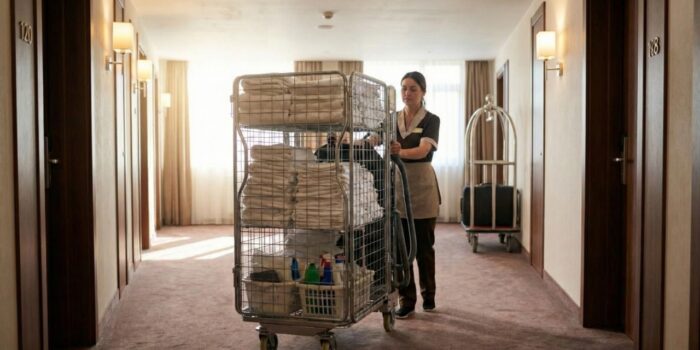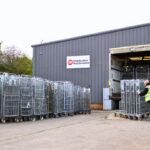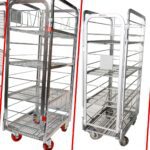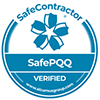Solve Manoeuvrability Issues with Expert Cage Wheel Repair
Imagine a busy warehouse floor. Roll cages are moving constantly, loaded with goods, heading to dispatch, or waiting to be filled. Now picture one of those cages. It’s not moving smoothly. It’s dragging, squeaking, perhaps getting stuck every few feet. This isn’t just an annoyance; it’s a direct hit to your warehouse’s efficiency and a potential safety hazard. Manoeuvrability issues with roll cages, often stemming from damaged cage wheels, can slow down operations, increase manual handling strain, and even lead to accidents. This is where expert cage wheel repair becomes crucial.
The Hidden Costs of Poor Roll Cage Manoeuvrability
A roll cage that doesn’t move properly creates several problems:
● Reduced Productivity: Workers spend more time and effort pushing or pulling a stubborn cage. This slows down picking, packing, and dispatch processes, directly impacting output.
● Increased Labour Strain: Fighting with a difficult cage puts strain on muscles and joints, leading to fatigue and a higher risk of musculoskeletal injuries for your staff.
● Damaged Goods and Equipment: A cage that swerves or jams can collide with other equipment, racking, or even other cages, causing damage to both the goods being transported and the warehouse infrastructure.
● Safety Hazards: An unpredictable cage can lose control, tip over, or trap a worker, creating a serious safety incident. Uncontrolled movement on a busy floor is dangerous.
● Operational Bottlenecks: A single un-manoeuvrable cage can hold up an entire loading bay or picking line, creating delays and frustrating your entire team.
These issues might seem small individually, but across a fleet of hundreds or thousands of roll cages, they quickly add up to significant financial losses and operational inefficiencies.
Common Causes of Cage Wheel Problems on Cages
Cage wheels, or castors, on roll cages are hardworking components. They endure constant motion, heavy loads, and often less-than-perfect floor surfaces. This heavy use leads to common problems:
● Worn-Out Bearings: Over time, the bearings within the castor wheels wear down. This causes friction, making the wheel stiff, noisy, and difficult to turn.
● Flat Spots: If a roll cage is left stationary under a heavy load for long periods, or if it experiences sudden impacts, the wheel material can develop flat spots. This leads to a bumpy, uneven ride and makes the cage harder to roll.
● Damaged or Missing Swivel Locks: Many roll cages have swivel castors that can be locked. If these locks become damaged, the cage can become unpredictable, making it difficult to steer in a straight line.
● Axle Damage: Bending or rusting of the axle can cause the wheel to wobble or seize entirely.
● Accumulation of Debris: Hair, string, plastic wrap, or other debris can get tangled around the axle or inside the castor housing, restricting wheel movement.
● Impact Damage: Collisions with forklifts, walls, or other equipment can bend castor frames or crack wheels.
Why Expert Cage Wheel Repair is the Smart Choice
When a roll cage wheel becomes problematic, the first thought might be to replace the entire cage. However, expert cage wheel repair offers a much more cost-effective and sustainable solution.
● Cost Savings: Repairing a wheel or replacing a single castor is considerably cheaper than buying a new roll cage. This saves your business capital that can be invested elsewhere.
● Extended Asset Lifespan: Regular repairs and maintenance, particularly of frequently used components like wheels, extend the overall working life of your roll cage fleet. This maximises your original investment.
● Reduced Waste: Opting for repair over replacement is a more environmentally friendly approach, reducing the amount of waste sent to landfill.
● Maintained Performance: Professional repair ensures that the roll cage is returned to its optimal operational standard, restoring smooth manoeuvrability and safety.
● Safety Compliance: Expert repairers understand the safety standards and ensure that repaired castors meet these requirements, helping you maintain a safe working environment.
The Professional Cage Wheel Repair Process
A proper cage wheel repair involves more than just a quick fix. A professional service follows a structured process:
● Assessment: Technicians first thoroughly inspect the problematic wheel and the entire castor assembly. They look for signs of wear, damage, debris, or misalignment.
● Disassembly: The affected wheel or castor unit is carefully removed from the roll cage.
● Cleaning: Any accumulated debris, dirt, or rust is cleaned away to ensure proper function.
● Repair or Replacement: Depending on the damage, the existing wheel might be repaired (e.g., new bearings, lubrication) or replaced with a new, compatible castor.
● Reassembly and Testing: The repaired or new castor is securely fitted back onto the roll cage. The roll cage is then tested to ensure smooth, unhindered movement and proper braking (if applicable).
● Full Roll Cage Inspection: Often, a professional repair service will also do a quick check of the rest of the roll cage for any other minor issues that could affect manoeuvrability or safety.
Distribution Maintenance: Your Partner for Cage Wheel Repair
At Distribution Maintenance, we understand that efficient roll cages are fundamental to your operations. We specialise in expert roll cage repair, including comprehensive cage wheel repair services. Our skilled engineers are highly trained and equipped to diagnose and fix a wide range of castor issues, from simple bearing replacements to full castor unit changes.
We pride ourselves on our ability to restore the smooth manoeuvrability of your roll cages quickly and efficiently. We also recognise that sometimes a repair isn’t enough, or a specific type of environment requires a different castor. That’s why Distribution Maintenance also has a wide range of castors available for replacement. This means we can provide the exact wheel solution your roll cage needs, ensuring optimal performance and safety.
Our services ensure your roll cages are always rolling freely, reducing worker strain and improving overall productivity. We understand the pressures of a busy warehouse and aim to minimise your downtime.
Preventive Measures: Keeping Your Cage Wheels Healthy
While expert repair is available, some preventive measures can extend the life of your trolley wheels:
● Regular Cleaning: Periodically clean debris from around the castor axles.
● Lubrication: Apply appropriate lubricant to bearings as recommended by the manufacturer.
● Load Limits: Always adhere to the stated load limits of your roll cages to prevent excessive stress on wheels.
● Smooth Surfaces: Where possible, maintain clean and even floor surfaces to reduce wear and impact on wheels.
● Routine Inspections: Regularly check wheels for excessive wear, flat spots, wobbles, or seizing.
Conclusion: Prioritising Manoeuvrability for Peak Performance
Smooth-rolling roll cages are a sign of an efficient operation. Manoeuvrability issues, often caused by problematic cage wheels, can silently drain your productivity and compromise safety. Investing in expert cage wheel repair is a smart, cost-effective decision that ensures your roll cages continue to perform optimally. Distribution Maintenance stands ready as your partner, offering specialised roll cage repair services and a wide selection of replacement castors available to keep your entire fleet moving freely. Don’t let sticky wheels slow you down; prioritise expert repair to maintain a highly productive and safe working environment.

